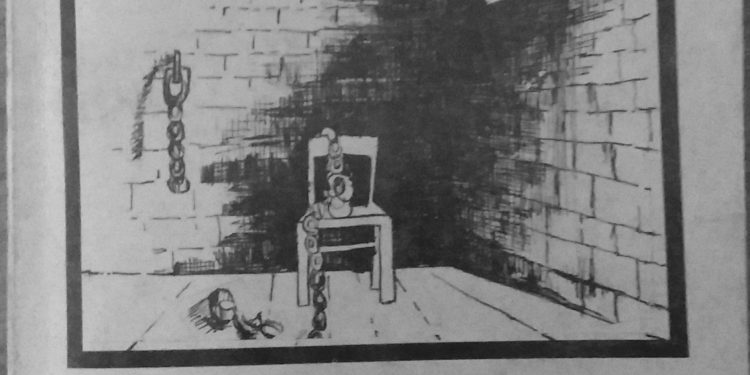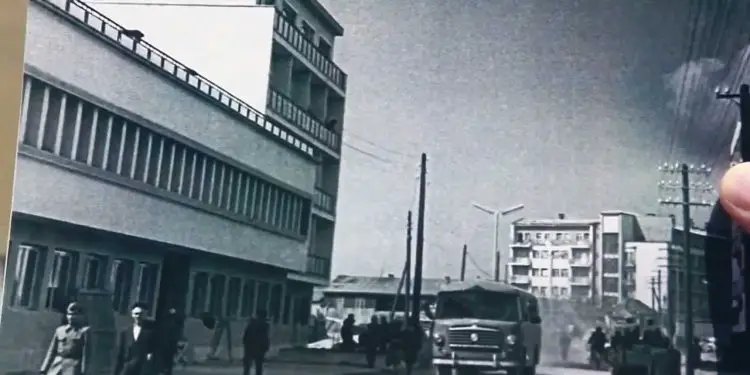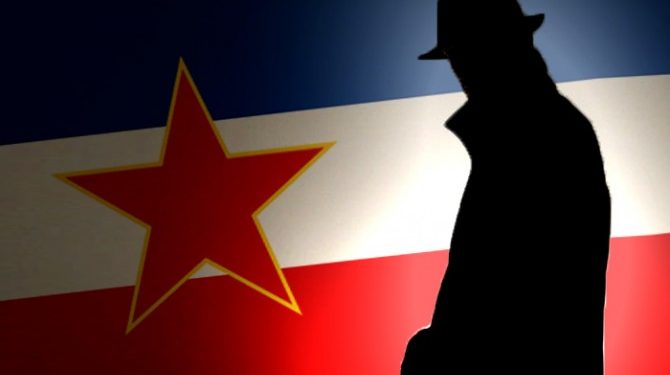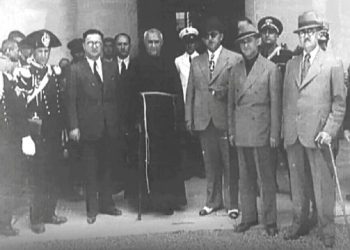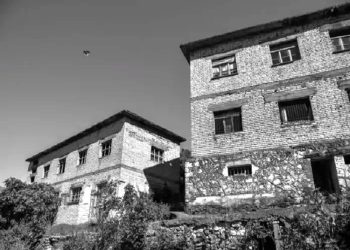
By Nazmi Berisha (Dyzi)
Part ten
Memorie.al publishes the unknown story of Nazmi Berisha, originally from the village of Llap in the Municipality of Podujeva in Kosovo, who was seduced by the propaganda of the communist regime and the programs provided by Radio Tirana for “socialist prosperity” and escaping the rank-and-file methods of the Titoist regime, in 1960, he decided to flee and came to Albania, crossing the Buna River by swimming in the great cold of that harsh winter. The rare testimonies of Nazmi Berisha, how he was received in his homeland, where the soldiers and border officers of the Shkodra district, after tying him with wire, sent him to the Internal Affairs Branch, where for 24 hours they did not even give him bread for eaten, and then sent to the town of Shijak where was the “Filtering Center” of Kosovar emigrants. The whole adventure of the 20-year-old boy from Kosovo that the State Security accused of: being a UDB agent, who had sent on a secret mission, Cedo Topallovic, the president of the UDB for Kosovo, to meet with the Rear Admiral of the Fleet, Teme Sejko and the inhuman tortures inflicted on him in the Internal Affairs Branches of Lushnja, Kruja, Tirana, etc., where he was kept in solitary confinement and asked to become a collaborator of the State Security, bringing out as witnesses, his compatriots from Kosovo, and his refusal, which made him spend a full 20 years in the prisons of the communist regime of Enver Hoxha. Nazmi Berisha has been living in Sweden for years and the articles published by Memorie.al have been selected from his book, ’20 years in Enver Hoxha’s prisons’ published by the Publishing House “UEGEN”, Berat, 1995.
Note to the editor and publisher
Evidence of civic courage, living testimony of a completely heartless human suffering, an archive that is valid for today and tomorrow.
Prison scenes run in front of you, honest and cannibalistic characters, ordinary people and you are left stunned by such a low action, so without dignity and profane of the communist administration.
20 years in Enver Hoxha’s communist prisons! The author never equates the dictator with Albania. The total disappointment of a guy who ran towards the star of his love, is not obscured. Everyone had almost the same fate. An unparalleled patience, an unwavering will of a diverse psychology full of dramatic colors, a monstrous fatigue.
Here is this book by Nazmi Berisha.
The characters are real.
Let each one prays to the God of truth.
Xhevahir Lleshi
Continues from the last number
Return to Kosovo after 21 years
Do you say this is the morning of my life? I had once dreamed of an extremely endless space and so I had entered the circles of communist hell. What the hell would I go into now? Insidious look by the Yugoslav customs. Finally comes my father, longing and tears flowing. Shaking hands and then to mom at home. Oh, miserable mother, it takes you 21 hours to get bored, not 21 years. The first licking. After three days I had to go to UDB, to submit the visa. To Hajrulla Kllokoçi, and then to Ibush Kllokoçi, who was his cousin.
The usual questions began. How I had decided to go to Albania, who I had talked to, how I had come out, who had accompanied me. Short, and concise, answers to what I was sure UDB knew. After three hours, my session continued after 15 days. Already indirect questions that would test my sincerity. But the basic question of the udbashi, Ibush, was: who had inspired me to go to Albania. And he waited for the answer like a cat, ready to jump on his prey.
But no, beautiful, because I was beaten with oil and with a lot, for 20 years in Enver Hoxha’s prisons. I was inspired by the Albanian language of my mother, who was raped so badly in Yugoslavia in those years, I was inspired by the mass displacement of Albanians in Turkey, during the action of collecting weapons, I was inspired by Adem Demaci, Haki Taha, Azem and Shote Galica, I was inspired by Radio Tirana that broadcasted beautiful Kosovar songs, I was inspired by Shaban Polluzha, the war in Kaçanik, the murders by UDB of Albanian nationalists. And where can I end my inspirations. Because every cell of mine has inspired me to go to Albania. So, oh submissive Kllokoç with all this I told you, do you deserve the fat salary of UDB?!
Maybe another day, I would continue my reasoning about the motives that made me leave Kosovo, Albania. I lived in my father’s house without a job. UDB was taking special care not to be employed, except on one condition, to speak on Prishtina Television about my suffering. And they would find me a job not anyway. But would I discredit my homeland for the interests of Yugoslavia?! Of course, since I made the difference, Enver Hoxha was a dictator. He and Albania were two opposite things, although they seemed to be related to each other. Then let me work as a laborer.
I then looked for a job and competed for the Grand Hotel. Ibushi called me to the investigator and no. I had to talk. I competed in the Kosovo Chamber of Commerce, in Tourist Kosovo, in Technical Hygiene, etc. Always before me Ibushi, and their huge ego. Then to live, during the day I had to dig holes, and build walls. I did not do well with my father. He was a fan of Enver Hoxha and in the big room he kept a picture of him. After so many conversations, he agreed to cover her with cloth. It did not occur to him that he was the most savage dictator, among others. Not the Albanian prophet and idol. This image will leave Kosovars, only when democracy wins in Albania.
One day, listening to Radio Tirana, the sensational news was given that Mehmet Shehu had killed himself. I could not step while the others were gathering fists. Thousands of questions flew so sharply towards Tirana, unanswered questions. We who suffered in Enver Hoxha’s black prisons were waiting for a day like this. The basic premise of the communists was that they ate each other. And in Albania, this was more evident than anywhere else. For the suicide and liquidation of Mehmet Shehu, Yugoslavia was silenced.
Found square to flatten. Mehmet Shehu was as criminal as Enver Hoxha. The moment of its liquidation came at a time when the Albanian economy took a downturn. During these years, I stayed in Pristina and received a Yugoslav passport, the value of which I would learn later. But more than anyone I felt good about my mother. Good my mother, a tall figure and incomparable to anyone. Two years had passed and I was living in Prishtina tired, overwhelmed.
One day he comes to the UDB office where I was called, a man I did not know. He provoked me by telling me that there was nothing that I had suffered for 20 years in the prisons of Albania and that I was a patriot, who in those years had become rare. I responded immediately, saying: Enver is cursing you every day, and you have nothing to do with him! You who are removed as a great state, are not able to deal with it.
I really suffered in prison, but I did not sell my soul to the tyrant. I resisted, but there are people here who cooperate with Tirana. Isn’t that so sir?! He did not get mad. He told me that I should not use the word sir and that I should be careful when I speak. That I was a cashier and that I was sent by Enver Hoxha. I knew that my objections had no value before that muzzle. But that I was sent by Enver Hoxha… I am the victim of his prisons!?
I knew the udbas could imprison me for false evidence but I knew myself. It did not take long and a journalist from “Tanjug” came to my house, who was interested in my suffering in communist Albania. I had to explain to her that in Albania, the police tortured people just like here.
She tried to justify herself, that these things had nothing to do with the interview. Laugh or cry. As if people of different languages were not equally hurt by hitting the rubber truncheon. Let this journalist find in the market, people who sold their suffering, cheap or expensive. She also left the house, just like the others. I did not compromise with my sufferings.
I did not deny Albania, just because Enver Hoxha had imprisoned me. I saw my misfortune as a tragedy of the Albanian nation. In 1984, I was hired as a porter at Dardania and stayed there until I left for Europe. There I had the opportunity to get acquainted with the tragic stories of Sami Dermaku, Shefqet Jashari, Kadri Rexha, Muharrem Thaçi, Nuri Bunjaku. Shefqet Jashari was arrested in the 1970s. While Sami Dermaku, was sentenced with Adem Demaçi, and the others in 1975, to 18 years in prison.
Judge Durmish Koçima, from Prizren, whom UDB had brought especially for him, when he asked Sami about the statement signed by him, then he had told him about the terrible tortures that had forced him to sign. And after the first sentence, he was re-sentenced for the second time, because he allegedly wanted to assassinate the head of UDB for Kosovo, Selim Brosha. He escapes and goes to Tropoja. Those of the Internal Branch, return him to the border, by decision of the Party. The Yugoslavs sentence him to 15 years and initially isolate him in his home. Sami takes advantage of the situation and escapes to the West.
The same thing happened with Kadri Rexha and his family. He is in Europe too. Muharrem Thaçi had killed in 1965, the killer of his father. Udbashin Pero Reshetarin. His assassination caused a stir in Kosovo. He is sentenced to 14 years in prison. And he escapes, but the Security hands him over to UDB. The tortures continue, so much so that the Serb prisoners themselves were shocked. And then they punish him.
We heard in the evening that Albania had returned two Kosovars. Nuri Bunjakun, and a friend of his. Blessed is the nation for that kind of party and for Enver. And the hour came. On April 11, 1985, Enver Hoxha died. And with it I hope the dictatorship dies. Who would follow him?! The young but old leader of Albania, Ramiz Alia. What a snake bite!
Here and Macbeth lady, Nexhmija, mourned for public consumption. Red carnations coming from Kosovo. In that Kosovo where the Security were ridiculed a lot. Hopefully the era of Enverist horrors died too. Time would thankfully bring it down quickly. In 1986, when I was walking the streets of Prishtina, I was provoked by UDB. A person named Ragip Raçi insults me and punches me in the face. I end up over 70 days at the doctor.
And the police were justified, as if Ragipi was looking for a student and he had been sentenced to two months. After that, I decided to leave for Europe. I was on the verge of arrest and I had to keep the classic calm. I had the experience of a lifetime. In 1987, I emigrated to Norway, where I was granted all rights.
I was tormented only by dreams about Spaç, Burrel, Çermë, Prishtina, Llap. I see that morning is coming for our nation. The sky is lit up on the horizon, although before every morning, the darkness is thick./Memorie.al
Pristina – Oslo, 1980-1990




